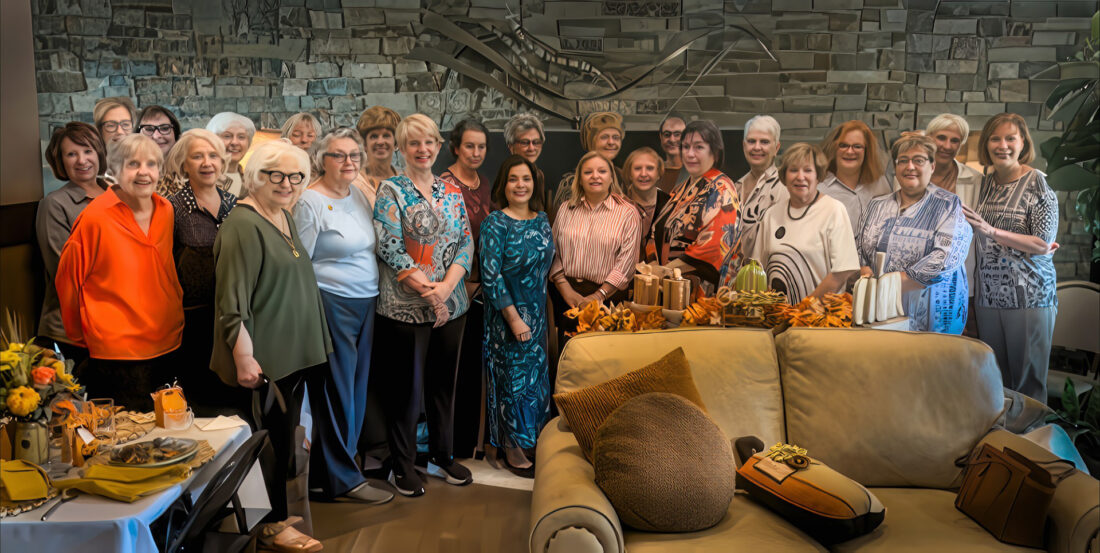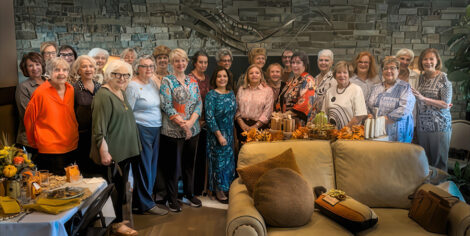For 124 years, this book club has connected Fort Dodge women
-
-Submitted photo
Members of the Ingleside Study Club stand together at one of their meetings.

-Submitted photo
Members of the Ingleside Study Club stand together at one of their meetings.
For well over a century, the Ingleside Study Club has connected women of Fort Dodge through their love of one of the world’s oldest forms of communication — reading a book.
The book club — the name Ingleside means fireside, around which books were often read — was formed in October 1901 by 11 women and has operated continuously to this day — when, today, 27 women meet twice a month to share a book and enjoy long friendships.
Ingleside’s founding came at a time when women were not allowed to vote — that would come two decades later with passage of the 19th Amendment to the U.S. Constitution. It was a club for women only, women who saw it as a means of self-education and self-improvement.
“The original founders of Ingleside Club were women who invested themselves and their families in constructing the foundations on which Fort Dodge is built — physically, culturally, spiritually,” said Joyce Garton-Natte, current president and a retired dentist and Presbyterian lay minister. “Members today are, likewise, invested in this city and influential in keeping that foundation firm.
“Women like Sarah Kelly, our longest-term member with 67 years of membership, personify the commitment and enthusiasm, supportiveness and gentility on which Ingleside was and is formed.
“I believe it is the weight of our foundational heritage — and the everlasting love of books and friendship — which inspire current members to keep Ingleside going into a, hopefully, unending future.”
Since being invited to join the club three years ago, Jeanine Nemitz, retired director of the city’s Foster Grandparent Program, has dug deep into Ingleside’s history.
“I myself am happy to note that the club has not avoided topics that might have been controversial,” she said, “including in the 1920s when a club member brought a ballot to the meeting to instruct fellow members in how to use their right to vote. Minutes noted that some members had been told by their husbands that their vote was unnecessary, as he would vote for the family. Advocacy for a community nurse in the early 1900s also highlighted the members who were not afraid to take on ‘City Hall’ in advocating for this important service for the less fortunate of the community.”
Current active members are Adrienne Adams, Pat Bennett, Rosalia Buda Claussen, Judy Delucca, RaeAnne Frey Marner, Joyce Garton-Natte, Jane Gibb, Sondra Holmstrom, Delpha Holtzman, Deb Johnson, Roma Johnson, Betsy Kentfield, Jill Lohff, Kathy Moe, Peggy Murphy, Jeanine Nemitz, Ann Powers, Sherri Schill, Judy Shimkat, Linda Ulstad, Kim Vosberg and Deb Zemke. Associate members are Patricia Crumley, Marilyn Graham, Karen Jackson, Sarah Kelly and Beverly Walker.
The club meets on the first and third Mondays of each month (once a month in January and February), most often in one another’s homes, from 1 to 3 pm, September through April. Membership is through invitation of members of the group and includes women who worked in a variety of professions, including teaching and health care.
The meeting format has remained the same over the years. Each meeting begins with dessert, a brief business session and then a presentation by a member who summarizes the book she chooses to read. A discussion of the book follows, punctuated by conversation among the friends. Sometimes there are props. At her first meeting, Nemitz said, the late Barbara O’Connor reviewed a book on international legend Coco Chanel “and brought hats, to talk about the fashion side of it.”
Once a year, in April, all members of Ingleside read the All Iowa Reads selection and discuss it as a group. Established by the State Library of Iowa in 2003, the goal of the All Iowa Reads program is to foster a sense of community through reading, with Iowans encouraged to come together in their communities to read and talk about a single book title in the same calendar year.
Annual dues are used for minimal club expenditures, and any remaining money is donated to the Fort Dodge Friends of the Library and to the Public Library itself in memory of members who have passed that year. When a member dies, Ingleside also donates a book in her memory to the library.
Sarah Kelly, 89, is Ingleside’s longest-tenured member with 67 years. From her residence at Friendship Haven, she said of her first days with the club:
“I was 22 years old, the youngest one, and every minute with them made my life more beautiful. They were all so kind to me and to each other. I brought my 5-year-old son John to many meetings. My daughter Clare also came to some of the meetings. The women were happy to have them there and they gave me advice about things. I never wanted to miss a meeting.
“Ingleside is just so important! Eventually we enlarged with new members. Young or old, we just blended in, and I feel so fortunate to have had them in my life.”
Roma Johnson, its newest member, joining in 2024, offered: “I was honored to be asked to join Ingleside and have enjoyed getting to know the ladies. I have always enjoyed book clubs because I love to read and discuss books. I am looking forward to many more lively meetings.”
The year 1901, when Ingleside was formed, was a memorable year in history. It included the assassination of U.S. President William McKinley on Sept. 14 and the succession of Theodore Roosevelt, the death of Queen Victoria and the end of the Victorian era in Britain, the first awarding of the Nobel Prizes, and the unification of Australia into a Commonwealth.
The names of initial members came from prominent families, familiar to those with a knowledge of Fort Dodge history — Coleman, Gustafson, Bennett, Loomis, Schaupp, Evans, Butler, Stowe, Deveraux, Craig, and Mitchell. Many lived in the area between Fourth Avenue South and Fifth Avenue North, between Ninth Street and 12th Street and came from prominent families, with help at home to give them freedom to join clubs like Ingleside, Nemitz said.
“They were women who wanted to not only better themselves, but have a voice in the community,” she said. “Once the club lobbied the City Council to establish a visiting nurse, to take care of less fortunate families. It’s always had a goal of self improvement as well as community awareness. The minutes show that Mary Stella Kelleher, the first woman from Fort Dodge to run for Iowa Secretary of State, once brought a ballot to a meeting to show members how to vote, even if some husbands thought that was their job for the family. Our late member Norma Schmoker was the first woman elected to the Fort Dodge School Board.”
Over the years, according to minutes of club meetings shared by Nemitz, members enjoyed books by authors such as Upton Sinclair, W.E.B. Dubois, W. Somerset Maugham, Eugene O’Neill, Agatha Christie, James Joyce, Sinclair Lewis, F. Scott Fitzgerald, Pearl S. Buck, Thomas Wolfe, Thornton Wilder and John Steinbeck.
At one meeting in 1936, the minutes show, a “Mrs. Kurtz” brought a new talking book machine to the meeting. This machine played records with 8,000 words per side. It allowed the blind to listen to books. Webster County possessed one of the machines and was able to request new records, which were delivered by mail free of charge.
In the turmoil of the 1960s, Ingleside members discussed books such as “Who’s Afraid of Virginia Wolfe” and “The Unsinkable Molly Brown.” The top-selling book in 1966 was “Valley of The Dolls.” In 1969, Kurt Vonnegut wrote “Slaughterhouse Five,” an anti-war novel that would become the topic of more than one Ingleside program over the years.
Constantine’s restaurant’s pecan pie was a popular dessert at meetings. Demitra Constantine was a member of Ingleside for many years.
With the 125th anniversary of Ingleside’s founding to be celebrated in October 2026, club members have chosen books from each of the decades of its existence to be read through the 2025-2026 club year.
It started two months ago, in September, when to mark the first decade of the 1900s, member Ann Powers reviewed a book on Peter Pan, “Peter and Wendy,” by James Matthew Barrie. In October, to mark the second decade, member Betsy Kentfield reviewed Agatha Christie’s “The Mysterious Affair at Styles.” In November, member Deb Zemke will review Ray Bradbury’s “Fahrenheit 451.”
Jane Gibb, a member for 45 years, said “there is great mutual respect and open-mindedness as far as books chosen for review. In January I will be selecting a book from the 1960s, an era when I was in high school and college. My challenge will be to decide which memorable book to review.”
She’s considering a brief survey of five works by female authors of the 1960s, including Rachel Carson’s “Silent Spring,” Harper Lee’s “To Kill a Mockingbird,” Sylvia Plath’s “The Bell Jar,” Betty Freidan’s “The Feminine Mystique” and Madeleine l’Engle’s “A Wrinkle in Time.”
“Ingleside is special,” Gibb said, “it has a rich history and some remarkable women. Dedicated, bright, caring women — who read!”


